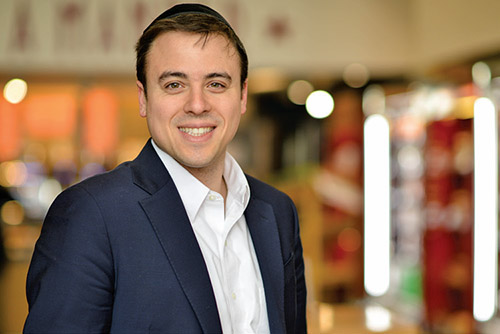
New research says no, as long as therapists respect religious thought and observance.
(Courtesy of Touro College) Religious individuals seeking mental health treatment do just as well with non-religious therapists as with therapists who share their level of religious observance, as long as therapists understand and respect the religion, according to a new study from Touro College published in the January issue of the Journal of Anxiety Disorders.
“The research suggests that treatment of clinical mood and anxiety disorders in the Orthodox Jewish community using a skills-based modality such as cognitive behavioral therapy (CBT) is equally effective on average when provided by Orthodox and non-Orthodox therapists, provided the non-Orthodox are familiar with Orthodox Jewish culture and respectful of religious-cultural differences,” said Steven Tzvi Pirutinsky, PhD, study author and assistant professor at the Touro College Graduate School of Social Work.
Orthodox Jews, who represent about 10% of the Jewish population in the U.S., were defined by study authors Pirutinsky and David H. Rosmarin, PhD, ABPP, an assistant professor in the department of psychiatry at Harvard Medical School, as those who follow traditional interpretations of Jewish law, for example keeping a kosher home and attending religious services regularly.
Many mental health clinicians have no religious beliefs, and little or no training on how to address patients’ spiritual and religious concerns, the authors pointed out. “Perhaps because of these factors, religious community members are substantially more likely to seek emotional support from clergy than mental health professionals, even for serious conditions,” they wrote.
Pirutinsky and Rosmarin expected that Orthodox patients would have more success if they were treated by an Orthodox therapist. To investigate, they followed 117 Orthodox Jewish patients and 91 non-Orthodox patients treated at the Center for Anxiety, an outpatient clinic in New York City. Fifteen Orthodox therapists and seven non-Orthodox therapists provided treatment.
Patients were matched with a therapist based on scheduling and clinical needs. Two of the Orthodox patients requested an Orthodox therapist, while one asked for a non-Orthodox therapist.
Orthodox patients started treatment with lower levels of anxiety and depression, on average, than the non-Orthodox patients. Symptoms declined more slowly over time for the religious patients than for the non-religious patients, so by the end of treatment both groups had similar improvement in their anxiety and depression symptoms.
A therapist’s religious affiliation had no impact on the effectiveness of treatment for anxiety and depression, the authors found.
Most study participants were Orthodox, and the non-Orthodox therapists were familiar with Orthodox culture, the authors note. Patients seeking care in a setting where clinicians are not familiar with their religious beliefs and norms “might not have such a favorable experience,” they added.
“The current study complements recent research on the importance of spiritual and religious life for mental health, by highlighting that the worlds of religion and mental health are closer than ever in history,” the authors concluded.
For more information on Touro College visit www.touro.edu.












